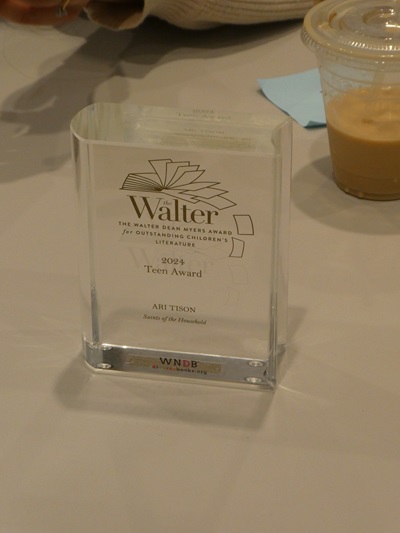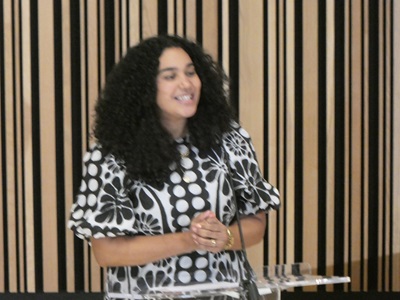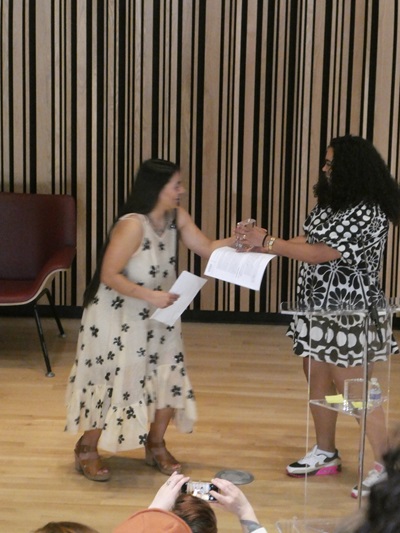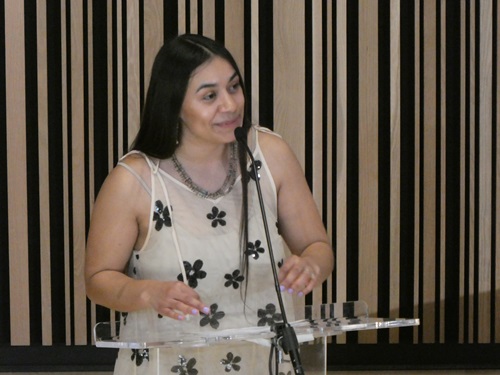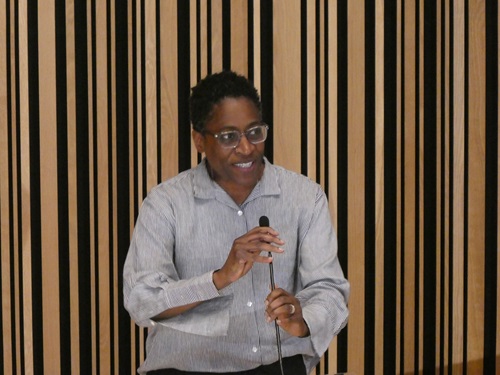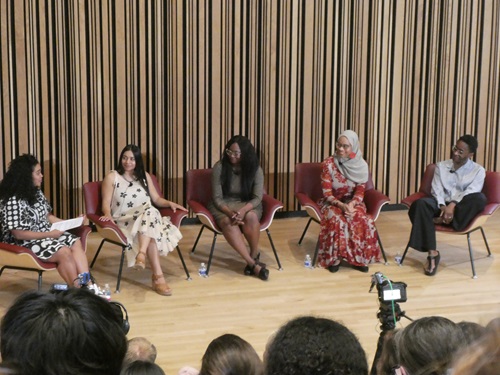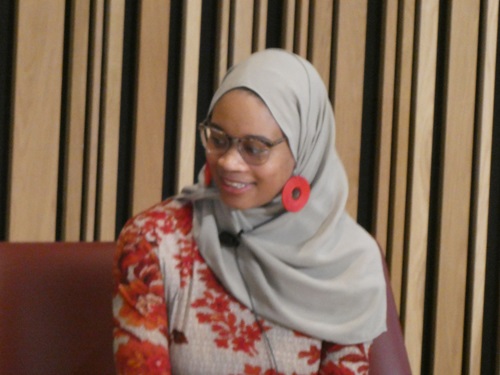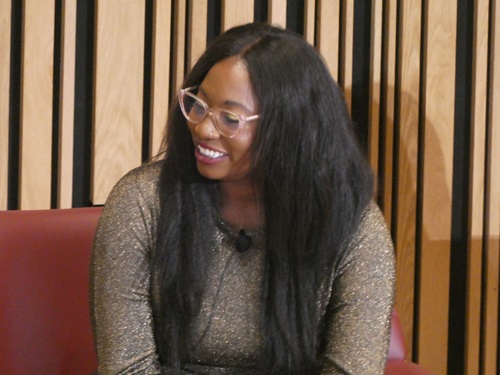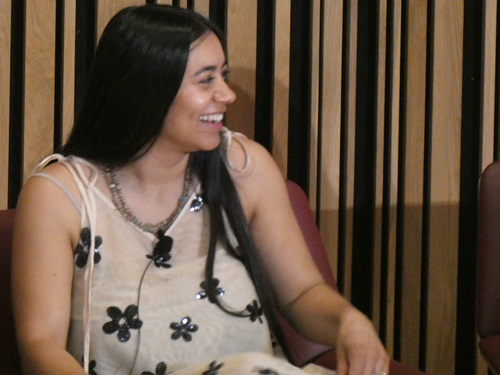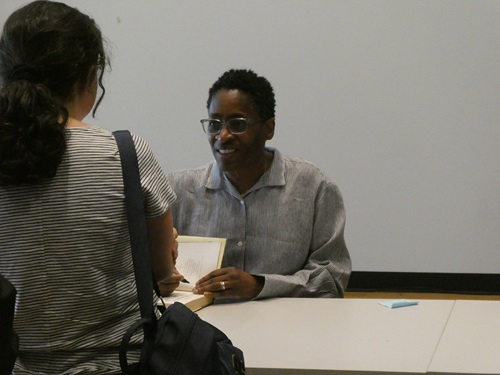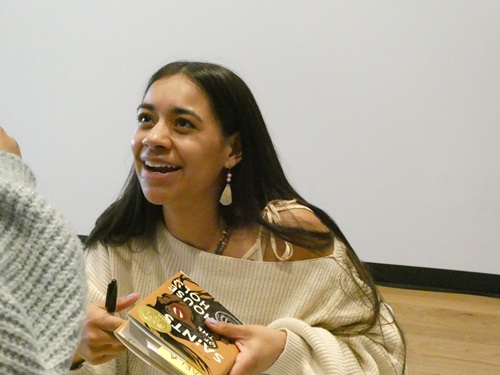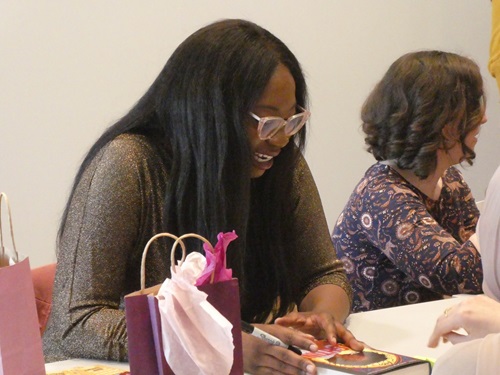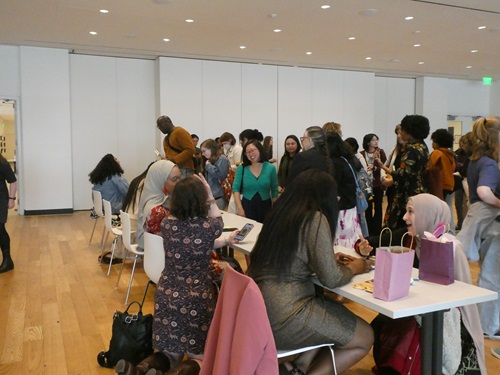On March 13, 2024, I got to attend the Walter Dean Myers Awards Celebration at Martin Luther King, Jr. Memorial Library in Washington, DC. The Walter Awards are presented by the organization We Need Diverse Books, begun ten years ago by Ellen Oh and other like-minded people.
Ellen Oh started us off, honoring ten years of the Walter Awards. The theme this year is: “There Is Work to Be Done.” I didn’t get the quote down exactly, but I believe she said that last year in children’s and young adult publishing, 45% of newly published books were diverse in some way. So yes! We have made great strides in having more diverse books available in our diverse country. But we all know that book banners are pushing back, and there is still work to be done.
Elizabeth Acevedo was the moderator this year. She’s a former Walter Award recipient herself, and she did a beautiful job moderating the discussion and giving out the awards.
But I was there to see Ari Tison and Hannah V. Sawyerr!
Why? Because they are two of “our” Finalists for the 2024 Morris Award, and I read their books two and three times and helped select them as Finalists. And love, love, love their books. Ari Tison, author of Saints of the Household, is pictured above. She was the winner of the 2024 Walter Award for Young Adult Literature, and as such she got to give a speech.
Highlights from Ari’s speech:
Of course, she first talked about how much she appreciates this honor and said that previous award winners were her mentor texts.
Life is sacred in a world with so much ugly. Her book is about art, family, monsters, brotherhood, and intertribal relationships. (I love this list, because I made a similar one on a sticky note when I was planning how to talk about this book with the Morris committee.) This book made her braver.
“Through books, we are woven together.”
“We write so young people can hold the world more fully.”
We see ourselves and the mosaic of life in books.
There are only five Bri Bri people (an indigenous group from Costa Rica) in the entire U.S. right now.
Diversity is reality. We (humanity) contain multitudes.
Keep going, so that the world of books looks like the world.
Next up was Jacqueline Woodson, who won the Children’s Literature Walter Award for her book Remember Us. First, Elizabeth Acevedo acknowledged that Jacqueline is the GOAT.
In Jacqueline’s speech, she spoke about her neighbor in Brooklyn, Walter Dean Myers’ granddaughter, Kazay. (I’m probably spelling that incorrectly.) She sees a future. She’s grinning, proud and grateful.
After that came a wonderful panel discussion moderated by Elizabeth Acevedo. The two winners were joined by the Honor Book Authors, Hannah V. Sawyerr (young adult) for All the Fighting Parts, and Jamilah Thompkins-Bigelow (children’s) as one of the four co-authors of Grounded.
The panel discussion was wonderful. I’ll repeat what I got written down in my notes.
The first question was in keeping with ten years of the Walter Awards, and was “Where were you ten years ago?”
Jamilah: She was the mom of a 4-year-old and a baby, and she was falling in love with picture books. But she wanted to see Black Muslim children. She started writing in 2015.
Jacqueline: She’d just won the National Book Award with Brown Girl Dreaming. It was time for change. She had a five-year-old. And people were taking a hard look at young people’s literature.
Hannah: She was a Senior in high school. She was annoyingly passionate, and always writing in the margins when in class. She was obsessed with open mics and really loved words and poetry.
Ari: She was also a Senior in high school and also annoying. [I got to thinking that 10 years from high school to award-winning debut novel is fantastic for both women.] Her reaction to difficulties was being an overachiever, after a scholarship to college. She bought herself a two-month novel-writing workshop. She had tenacity and annoyingness.
Next question: What do you hope this book shows readers and what did it show you?
Jacqueline: Her character loves basketball and gets bullied. We have so much more than what the world sees in us. It made her grateful for the past. This is a journey, a movement.
Ari: It’s important to have hope in books for young people. She learned about PTSD – wanted to show you can get past trauma. She showed opportunities for healing: Art, friendships, community.
Hannah: Her book is a Me, Too, novel. She’d experienced shame and self-blame. Her book is about believing: It was not your fault. She hopes that message gets to readers.
Jamilah: It’s an important book for their community, a fun book in a space (an airport) that’s often fraught for Muslims.
Elizabeth: Sometimes the way we define success is different than the world. How do you define success?
Ari: We all come from storytellers. Her people haven’t had their stories told. In Bri Bri, Story = History = Wind = Knowledge. It helps her get grounded. Everything is a gift. She’s here because of something beyond the physical.
Hannah: Her writing is selfish – to figure things out and address honestly. Writing is taking risks. Success is wrapped up in integrity. (But later she did say that her book is not Autobiography. It’s “Auto-fiction.” Her character is not herself.)
Jamilah: Success is feeling like her work is opening spaces for other authors. When others take inspiration from her writing, that feels very successful.
Jacqueline: Success is doing what she loves, and making that choice to do it, even though her family told her not to. (Because Black people don’t make a living writing books.) Mentors began the journey and many are no longer here. Folks of color don’t live as long as white folks. Still being here and doing the work is success. She loves her people and she loves writing.
Elizabeth (to Hannah): Part of the journey is passing it on. [Then Jacqueline made her tell the story of, as a teen, prompted by her middle school teacher Phil Bildner, writing a letter to Angela Johnson about the book Heaven. She didn’t get an answer — until the book The First Part Last came out, dedicated to her. It was the first time she saw her name in print.] Healing is also part of fighting back. How do you make space for the many definitions of it?
Hannah: Her journey in the court system was eight years long. She came forward about abuse her senior year of high school. For a long time she didn’t think she was a fighter, and felt very small. Her biggest accomplishment was finishing the first draft. Many times, she was tempted to drop out. She got the contract on her book before she got the verdict in court. You get so fed up with the process. She survived that event, but it doesn’t define her. She’s so much more than that and is carrying on. (And the secondary character, who didn’t take the abuser to court, was fighting, too.)
Elizabeth (to Jamilah): How did the story come together with four authors?
Jamilah: Lots of credit to Aisha Saeed – it was her original idea. She wanted representation of different Muslim voices. There’s lots of diversity within their diversity. They each took from their own communities. They wrote Grounded during the pandemic to help feel grounded. They met every couple weeks on Zoom, wanting to escape.
Elizabeth (To Ari): Some of the Bri Bri stories you used in your book had never been put into English before. How did you work them into your narrative?
Ari: There were three levels of colonization in Costa Rica. She also learned Spanish when there in their territory. For Native people, story is a big way they survived. She cited a study that if Native teens know their creation stories, they are less likely to self-harm. She was looking for ways to make the story bigger than hers alone. Her ancestors’ stories are there, too. Folklore gives us insight into our own lives, and it was important to include those, too.
Elizabeth (to Jacqueline): Why that neighborhood and background?
Jacqueline: Bushwick started out as Irish and German. When Black folks moved in, the landlords started setting fires to get insurance money. Now, it’s an artist-hipster neighborhood. Folks talk about “discovering” Bushwick, which erases the history that went before. There were no trees when she grew up there. Now destruction is still happening, but now it’s through unhousing people by building expensive housing. We don’t have to recreate the wheel for social justice.
Okay, after that the teens attending got to ask question. They had brought in students from local high schools, and it made my heart happy to see how excited they were about the books and to talk with the authors. After all our discussing the books on the Morris committee, I loved seeing that teens love the books, too.
After that was a signing. I was anxious by this time. I’d been told I could go to the Awards ceremony, but I should get back for our department staff meeting at 1:30.
But I had to meet Ari and tell her how much I loved the book! It made her smile to see the Morris Finalist sticker on the front of mine!
I got in Hannah’s line next, but finally had to give up. Both Ari and Hannah were spending time talking with each person (mostly teens) who got a signature — and that was beautiful to see, so I couldn’t begrudge them.
So I took a picture of the happy crowd before I left. Then I was late back (and Constitution Avenue was blocked off, so I had to take a detour past the just-beginning cherry blossoms of the Tidal Basin) — but the meeting had been cancelled! I wish I’d checked email before I left that morning – and stayed in Hannah’s line!
But the whole thing was a fabulous celebration of diversity in young people’s literature. May this legacy continue!
